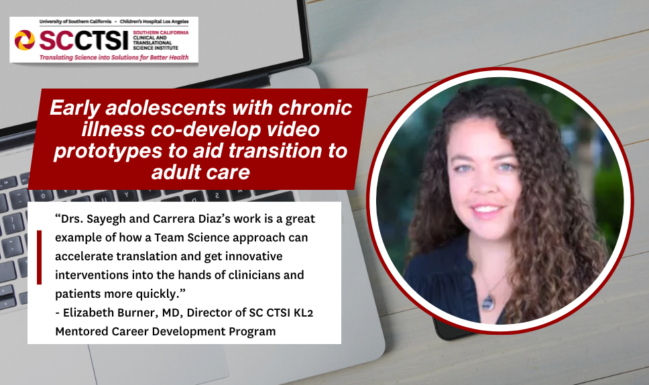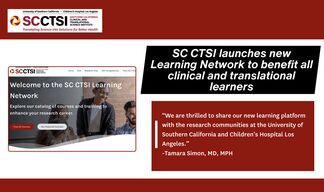Early adolescents with chronic illness co-develop video prototypes to aid eventual transition to adult care
SC CTSI fellowship provided USC researcher with team science skills to study and improve mobile health interventions.
Early adolescents (ages 12-to-14) with chronic health conditions realize that they will be transitioning to adult care in a few years and that they should start thinking about that process now.
“It can be stressful and scary to think about transitioning to adult care,” says Caitlin Sayegh, PhD, assistant professor of clinical pediatrics at the University of Southern California Keck School of Medicine. Sayegh is primary investigator studying mobile health (mHealth) interventions for youth with chronic illness.
“However, researchers and clinicians have reached a consensus that early adolescents should begin understanding their diagnosis and health care and develop a voice for self-advocacy, preparing themselves for the future,” Sayegh added.

Now, several young patients are collaborating on a project to co-design mHealth interventions using smart phones and other devices to help guide first steps of the eventual transition to adult care, according to a recent study in the Journal of Pediatric Psychology. The project is sponsored by the CHLA Center for Healthy Adolescent Transition.
Kenia Carrera Diaz, PhD, who joined the study as a postdoctoral psychology fellow at Children’s Hospital Los Angeles (CHLA), performed qualitative interviews of participants, 11 youth with chronic conditions and eight caregivers.
Carrera Diaz, the study’s first author, worked with a multidisciplinary team representing the disciplines of psychology, public health, patient and family education, information technology and services, human-centered design, nursing, and self-advocacy, found that the young participants were highly motivated to prepare for adult care.
“It is important to partner with young patients and listen to their knowledge so we can develop and create engaging and effective interventions,” Diaz said. “The approach we use should be something they like and can engage with.”
This team-science approach integrated perspectives from young patients, caregivers and clinicians. Youth and caregivers recommended avoiding complex topics, such as dealing with insurance providers and scheduling appointments, as these were deemed too advanced for this age group.
“The participants helped us center on skills needed in early adolescence, looking at things more in their realm,” said Sayegh. “We explored skills such as cultivating your voice, being able to ask a question of your doctor or nurse and starting to recognize what it means to have a chronic health condition.”
The Adolescent and Young Adult Advisory Council at CHLA partnered in the project, emphasizing the importance of age-appropriate content. The council provides advice on various projects, including clinical services, new projects, workshops and research projects.
Contributors to the team-science effort concluded that creating 30-second social media-style videos would be the most effective approach. Young participants co-authored some video scripts and provided suggestions to make information more accessible, relatable and engaging.
“Working in a team for a big goal was new to me, and it helped me understand the different perspectives everyone had and how we could all come together and build these videos to help patients,” said Adan, a study co-author. This 19-year-old psychology student at Santa Monica College is a member of the Adolescent and Young Adult Advisory Council at CHLA.
Previously, Sayegh received a three-year KL2 Mentored Career Development award, supported by the Southern California Clinical and Translational Science Institute (SC CTSI), where she learned the principles and benefits of team science.
“If translational science is to be successful, you usually need teams because our different disciplines have different lenses and tools,” Sayegh said.
The KL2 Program provides protected research time for clinicians and enables scholars to conduct multidisciplinary projects. The program focuses on designing, conducting and analyzing clinical research in a team-based setting.
“Drs. Sayegh and Carrera Diaz’s work is a great example of how a Team Science approach can accelerate translation and get innovative interventions into the hands of clinicians and patients more quickly,” noted Elizabeth Burner, MD, PhD, MPH, director of the SC CTSI KL2 Mentored Career Development Program. “They also implemented concepted of Community Engaged research, to encourage patient engagement. It is so rewarding to see a program alum implement the principles that we encourage and reinforce throughout the KL2 training program.”
In the next phase of their work, researchers will work on validating the efficacy of the videos and implementing them across the hospital.
“We would experiment with strategies such as text-messaging teens before provider appointments, so they can watch videos to prepare,” Sayegh said. “We would have providers share the videos on iPads or play them in the waiting rooms in the hospital. We will study the implementation of the project and how far we can reach out with these videos, to see whether people are engaged with them through viewing, sharing and commenting.”



